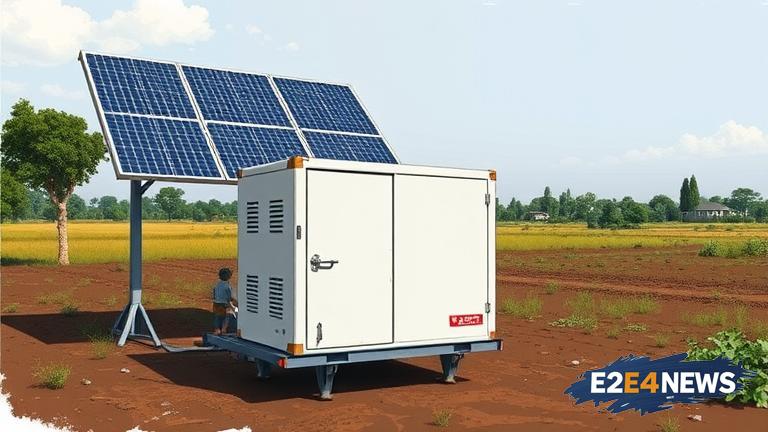In a groundbreaking move, Malawi has introduced a solar-powered vaccine delivery refrigeration system, aimed at improving vaccine accessibility and efficacy in rural areas. This innovative technology is set to revolutionize the way vaccines are transported and stored, particularly in areas with limited access to electricity. The solar-powered refrigeration system is designed to maintain the optimal temperature range for vaccine storage, ensuring their potency and effectiveness. This development is crucial in Malawi, where vaccine delivery has been hindered by inadequate infrastructure and limited resources. The new system is expected to increase vaccine coverage, particularly in rural areas where healthcare facilities often lack reliable electricity. The solar-powered refrigeration units are equipped with advanced technology, including temperature monitoring and control systems, to ensure the vaccines are stored at the correct temperature. This innovation is a significant step forward in the fight against vaccine-preventable diseases, which claim thousands of lives in Malawi each year. The introduction of solar-powered vaccine delivery refrigeration is also expected to reduce vaccine wastage, which is a significant problem in many developing countries. According to the World Health Organization (WHO), vaccine wastage can be as high as 50% in some areas, due to inadequate storage and handling. The solar-powered refrigeration system is designed to be energy-efficient, reliable, and easy to maintain, making it an ideal solution for rural areas. The technology has been developed in partnership with international organizations and local healthcare providers, ensuring that it meets the specific needs of Malawi’s healthcare system. The introduction of solar-powered vaccine delivery refrigeration is part of a broader effort to strengthen Malawi’s healthcare infrastructure, which has been weakened by years of underfunding and neglect. The government of Malawi has committed to increasing investment in healthcare, with a focus on improving access to essential services, including vaccination. The solar-powered refrigeration system is also expected to have a positive impact on the environment, as it reduces reliance on fossil fuels and lowers carbon emissions. The technology is also scalable, making it possible to replicate in other areas of the country, and even in other countries facing similar challenges. The introduction of solar-powered vaccine delivery refrigeration is a testament to the power of innovation and collaboration in addressing some of the world’s most pressing healthcare challenges. As the world continues to grapple with the challenges of vaccine delivery, Malawi’s solar-powered refrigeration system offers a beacon of hope for improving vaccine accessibility and efficacy. The technology has the potential to save thousands of lives, and to reduce the burden of vaccine-preventable diseases on communities. The solar-powered refrigeration system is also expected to have a positive impact on the economy, as it reduces the financial burden of vaccine wastage and improves the overall efficiency of the healthcare system. In conclusion, Malawi’s solar-powered vaccine delivery refrigeration system is a groundbreaking innovation that has the potential to revolutionize the way vaccines are transported and stored. The technology is a significant step forward in the fight against vaccine-preventable diseases, and offers a beacon of hope for improving vaccine accessibility and efficacy in rural areas.
